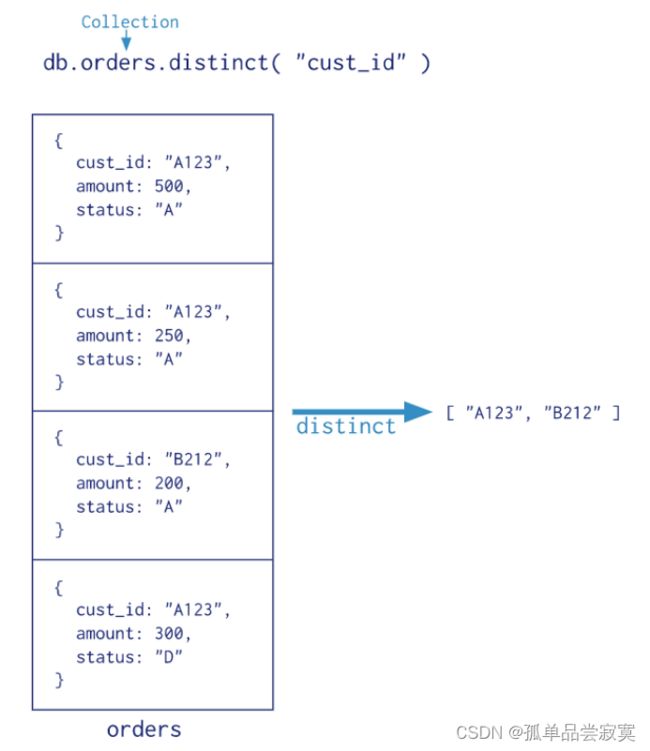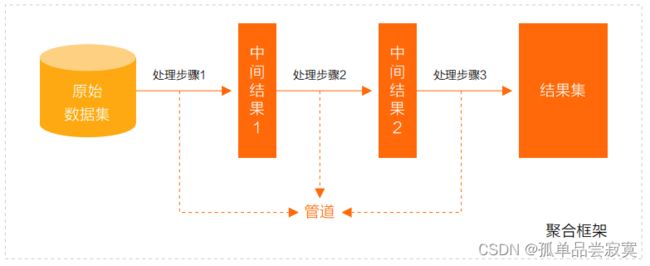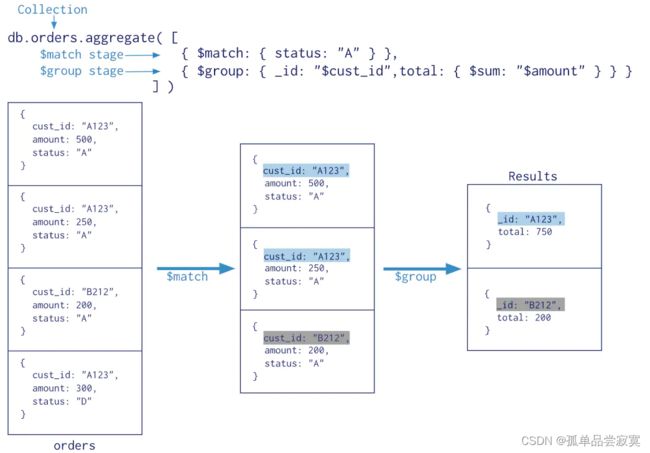MongoDB聚合操作-02
一、聚合操作
聚合操作处理数据记录并返回计算结果。 聚合操作组值来自多个文档,可以对分组数据执行 各种操作以返回单个结果。 聚合操作包含三类:单一作用聚合、聚合管道、MapReduce。
单一作用聚合:提供了对常见聚合过程的简单访问,操作都从单个集合聚合文 档。
聚合管道是一个数据聚合的框架,模型基于数据处理流水线的概念。 文档进入多 级管道,将 文档转换为聚合结果。
MapReduce操作具有两个阶段:处理每个文档并向每个输入文档发射一个或多个对象的map阶段,以及reduce组合map操作的输出阶段。
1、单一作用聚合
MongoDB提供 db.collection.estimatedDocumentCount(), db.collection.count(), db.collection.distinct() 这类单一作用的聚合函数。 所有这些操作都聚合来自单个集合的
文档。虽然这些操作提供了对公共聚合过程的简单访问,但它们缺乏聚合管道和mapReduce的灵活性和功能。
|
db.collection.estimatedDocumentCou
nt()
|
返回集合或视图中所有文档的计数
|
|
db.collection.count()
|
返回与find()集合或视图的查询匹配的文档计数 。等同于
db.collection.find(query).count()构造
|
|
db.collection.distinct()
|
在单个集合或视图中查找指定字段的不同值,并在数组中
返回结果。
|
#检索books集合中所有文档的计数
db.books.estimatedDocumentCount()
#计算与查询匹配的所有文档
db.books.count({favCount:{$gt:50}})
#返回不同type的数组
db.books.distinct("type")
#返回收藏数大于90的文档不同type的数组
db.books.distinct("type",{favCount:{$gt:90}}) 注意:在分片群集上,如果存在孤立文档或正在进行块迁移,则db.collection.count()
没有查询谓词可能导致计数不准确。要避免这些情况,请在分片群集上使用
db.collection.aggregate()方法。
2、聚合管道
什么是 MongoDB 聚合框架
MongoDB 聚合框架(Aggregation Framework)是一个计算框架 ,它可以: 作用在一个或几个集合上; 对集合中的数据进行的一系列运算; 将这些数据转化为期望的形式;
从效果而言,聚合框架相当于 SQL 查询中的GROUP BY、 LEFT OUTER JOIN 、 AS等。
管道(Pipeline)和阶段( Stage) 整个聚合运算过程称为管道(Pipeline),它是由多个阶段(
Stage)组成的 , 每个管道: 接受一系列文档(原始数据); 每个阶段对这些文档进行一系列运算; 结果文档输出给下一个阶段;
聚合管道操作语法
pipeline = [$stage1, $stage2, ...$stageN];
db.collection.aggregate(pipeline, {options}) pipelines 一组数据聚合阶段。除$out、$Merge和$geonear阶段之外,每个阶 段都可以在管道中出现多次。
options 可选,聚合操作的其他参数。包含:查询计划、是否使用临时文件、 游标、最大操作时间、读写策略、强制索引等等
常用的管道聚合阶段
聚合管道包含非常丰富的聚合阶段,下面是最常用的聚合阶段
数据准备
准备数据集,执行脚本
var tags = ["nosql","mongodb","document","developer","popular"];
var types = ["technology","sociality","travel","novel","literature"];
var books=[];
for(var i=0;i<50;i++){
var typeIdx = Math.floor(Math.random()*types.length);
var tagIdx = Math.floor(Math.random()*tags.length);
var tagIdx2 = Math.floor(Math.random()*tags.length);
var favCount = Math.floor(Math.random()*100);
var username = "xx00"+Math.floor(Math.random()*10);
var age = 20 + Math.floor(Math.random()*15);
var book = {
title: "book‐"+i,
type: types[typeIdx],
tag: [tags[tagIdx],tags[tagIdx2]],
favCount: favCount,
author: {name:username,age:age}
};
books.push(book)
}
db.books.insertMany(books);$project
投影操作 , 将原始字段投影成指定名称, 如将集合中的 title 投影成 name
db.books.aggregate([{$project:{name:"$title"}}]) $project 可以灵活控制输出文档的格式 ,也可以剔除不需要的字段
db.books.aggregate([{$project:{name:"$title",_id:0,type:1,author:1}}]) 从嵌套文档中排除字段
db.books.aggregate([
{$project:{name:"$title",_id:0,type:1,"author.name":1}}
])
或者
db.books.aggregate([
{$project:{name:"$title",_id:0,type:1,author:{name:1}}}
])$match
$match用于对文档进行筛选 ,之后可以在得到的文档子集上做聚合,$match可以使
用除了地理空间之外的所有常规查询操作符, 在实际应用中尽可能将$match放在管道的前
面位置 。这样有两个好处:一是可以快速将不需要的文档过滤掉,以减少管道的工作量;二
是如果再投射和分组之前执行$match,查询可以使用索引。
db.books.aggregate([{$match:{type:"technology"}}]) 筛选管道操作和其他管道操作配合时候时,尽量放到开始阶段,这样可以减少后续管道
操作符要操作的文档数,提升效率
db.books.aggregate([
{$match:{type:"technology"}},
{$project:{name:"$title",_id:0,type:1,author:{name:1}}}
])$count
计数并返回与查询匹配的结果数
db.books.aggregate([
{$match:{type:"technology"}},
{$count: "type_count"}
]) $match阶段筛选出type匹配technology的文档,并传到下一阶段;
$count 阶段返回聚合管道中剩余文档的计数,并将该值分配给type_count
$group
按指定的表达式对文档进行分组,并将每个不同分组的文档输出到下一个阶段 。输出文档包
含一个_id字段,该字段按键包含不同的组。
输出文档还可以包含计算字段,该字段保存由$group的_id字段分组的一些accumulator表
达式的值。 $group不会输出具体的文档而只是统计信息.
{ $group: { _id: , : { :
}, ... } } 1、_id字段是必填的;但是,可以指定_id值为null来为整个输入文档计算累计值。
2、剩余的计算字段是可选的,并使用运算符进行计算。
3、_id和表达式可以接受任何有效的 表达式 。
accumulator操作符
|
名称
|
描述 | 类比sql |
|
$avg
|
计算均值
|
avg
|
|
$first
|
返回每组第一个文档,如果有排序,按照排序,如果没有按照默认的 存储的顺序的第一个文档。
|
limit0,1
|
|
$last
|
返回每组最后一个文档,如果有排序,按照排序,如果没有按照默认 的存储的顺序的最后个文档
|
|
|
$max
|
根据分组,获取集合中所有文档对应值得最大值
|
max
|
|
$min
|
根据分组,获取集合中所有文档对应值得最小值。
|
min
|
|
$pus
|
将指定的表达式的值添加到一个数组中
|
|
|
$addToSet
|
将表达式的值添加到一个集合中(无重复值,无序)
|
|
|
$sum
|
计算总和
|
sum
|
|
$stdDevPop
|
返回输入值的总体标准偏差(population standard deviation)
|
|
|
$stdDevSamp
|
返回输入值的样本标准偏差(the sample standard deviation)
|
$group阶段的内存限制为100M。默认情况下,如果stage超过此限制,$group将产生错
误。 但是,要允许处理大型数据集,请将allowDiskUse选项设置为true以启用$group操作
以写入临时文件。
book的数量,收藏总数和平均值
db.books.aggregate([
{$group:{_id:null,count:{$sum:1},pop:{$sum:"$favCount"},avg:{$avg:"$favCount"}}}
]) 统计每个作者的book收藏总数
db.books.aggregate([
{$group:{_id:"$author.name",pop:{$sum:"$favCount"}}}
]) 统计每个作者的每本book的收藏数
db.books.aggregate([
{$group:{_id:{name:"$author.name",title:"$title"},pop:{$sum:"$favCount"}}}
]) 每个作者的book的type合集
db.books.aggregate([
{$group:{_id:"$author.name",types:{$addToSet:"$type"}}}
])$unwind
可以将数组拆分为单独的文档
{
$unwind:
{
#要指定字段路径,在字段名称前加上$符并用引号括起来。
path: ,
#可选,一个新字段的名称用于存放元素的数组索引。该名称不能以$开头。
includeArrayIndex: ,
#可选,default :false,若为true,如果路径为空,缺少或为空数组,则$unwind输出文档
preserveNullAndEmptyArrays:
} } 姓名为xx006的作者的book的tag数组拆分为多个文档
db.books.aggregate([
{$match:{"author.name":"xx006"}},
{$unwind:"$tag"}
])
db.books.aggregate([
{$match:{"author.name":"xx006"}}
]) 每个作者的book的tag合集
db.books.aggregate([
{$unwind:"$tag"},
{$group:{_id:"$author.name",types:{$addToSet:"$tag"}}}
])$limit
db.books.aggregate([
{$limit : 5 }
]) 此操作仅返回管道传递给它的前5个文档。 $limit对其传递的文档内容没有影响。
注意:当$sort在管道中的$limit之前立即出现时,$sort操作只会在过程中维持前n个结
果 ,其中n是指定的限制,而MongoDB只需要将n个项存储在内存中。
$skip
跳过进入stage的指定数量的文档,并将其余文档传递到管道中的下一个阶段
db.books.aggregate([
{$skip : 5 }
]) 此操作将跳过管道传递给它的前5个文档。 $skip对沿着管道传递的文档的内容没有影响。
$sort
对所有输入文档进行排序,并按排序顺序将它们返回到管道。
语法:
{ $sort: { : , : ... } } 要对字段进行排序,请将排序顺序设置为1或-1,以分别指定升序或降序排序,如下例所
示:
db.books.aggregate([
{$sort : {favCount:‐1,title:1}}
])$lookup
Mongodb 3.2版本新增,主要用来实现多表关联查询, 相当关系型数据库中多表关联查
询。 每个输入待处理的文档,经过$lookup 阶段的处理,输出的新文档中会包含一个新生
成的数组 (可根据需要命名新key )。数组列存放的数据是来自被Join集合的适配文档,如
果没有,集合为空(即 为[ ])
语法:
db.collection.aggregate([{
$lookup: {
from: "",
localField: "",
foreignField: "",
as: " |
from
|
同一个数据库下等待被Join的集合。
|
|
localField
|
源集合中的match值,如果输入的集合中,某文档没有 localField 这个Key(Field),在处理的过程中,会默认为此文档含 有 localField:null的键值对。
|
|
foreignField
|
待Join的集合的match值,如果待Join的集合中,文档没有foreignField 值,在处理的过程中,会默认为此文档含有 foreignField:null的键值对。
|
|
as
|
为输出文档的新增值命名。如果输入的集合中已存在该值,则会覆盖掉
|
注意:null = null 此为真
其语法功能类似于下面的伪SQL语句:
SELECT *, 案例
数据准备
db.customer.insert({customerCode:1,name:"customer1",phone:"13112345678",address:"test1"})
db.customer.insert({customerCode:2,name:"customer2",phone:"13112345679",address:"test2"})
db.order.insert({orderId:1,orderCode:"order001",customerCode:1,price:200})
db.order.insert({orderId:2,orderCode:"order002",customerCode:2,price:400})
db.orderItem.insert({itemId:1,productName:"apples",qutity:2,orderId:1})
db.orderItem.insert({itemId:2,productName:"oranges",qutity:2,orderId:1})
db.orderItem.insert({itemId:3,productName:"mangoes",qutity:2,orderId:1})
db.orderItem.insert({itemId:4,productName:"apples",qutity:2,orderId:2})
db.orderItem.insert({itemId:5,productName:"oranges",qutity:2,orderId:2})
db.orderItem.insert({itemId:6,productName:"mangoes",qutity:2,orderId:2}) 关联查询
db.customer.aggregate([
{$lookup: {
from: "order",
localField: "customerId",
foreignField: "customerId",
as: "customerOrder"
}
}
])
db.order.aggregate([
{$lookup: {
from: "customer",
localField: "customerCode",
foreignField: "customerCode",
as: "curstomer"
}
},
{$lookup: {
from: "orderItem",
localField: "orderId",
foreignField: "orderId",
as: "orderItem"
}
} ]) 聚合操作案例1
统计每个分类的book文档数量
db.books.aggregate([
{$group:{_id:"$type",total:{$sum:1}}},
{$sort:{total:‐1}}
]) 标签的热度排行,标签的热度则按其关联book文档的收藏数( favCount)来计算
db.books.aggregate([
{$match:{favCount:{$gt:0}}},
{$unwind:"$tag"},
{$group:{_id:"$tag",total:{$sum:"$favCount"}}},
{$sort:{total:‐1}}
]) 1. $match阶段:用于过滤favCount=0的文档。
2. $unwind阶段:用于将标签数组进行展开,这样一个包含3个标签的文档会被拆解 为3个条目。
3. $group阶段:对拆解后的文档进行分组计算,$sum:"$favCount"表示按 favCount字段进行累加。
4. $sort阶段:接收分组计算的输出,按total得分进行排序。
统计book文档收藏数[0,10),[10,60),[60,80),[80,100),[100,+∞)
db.books.aggregate([{
$bucket:{
groupBy:"$favCount",
boundaries:[0,10,60,80,100],
default:"other",
output:{"count":{$sum:1}}
}
}])二、MapReduce
MapReduce操作将大量的数据处理工作拆分成多个线程并行处理,然后将结果合并在一
起。MongoDB提供的Map-Reduce非常灵活,对于大规模数据分析也相当实用。
MapReduce具有两个阶段:
1. 将具有相同Key的文档数据整合在一起的map阶段
2. 组合map操作的结果进行统计输出的reduce阶段
从MongoDB 5.0开始,map-reduce操作已被弃用。 聚合管道比映射-reduce操作提供更
好的性能和可用性。Map-reduce操作可以使用聚合管道操作符重写,例如$group、
$merge等



